Bela Tarr
-
Trailer Watch: 4K Restoration of Béla Tarr and Ágnes Hranitzky’s Werckmeister Harmonies
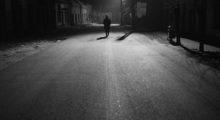
A trailer has arrived for the 4K restoration of Béla Tarr and Ágnes Hranitzky’s 2000 film Werckmeister Harmonies from Janus Films. Based on the 1989 novel The Melancholy of Resistance by Hungarian writer László Krasznahorkai, the film will be re-released in New York later this month with more cities to follow. An official synopsis reads: One of the major achievements of twenty-first-century cinema thus far, Béla Tarr’s mesmeric parable of societal collapse is an enigma of transcendent visual, philosophical, and mystical resonance. Adapted from a novel by the celebrated writer and frequent Tarr collaborator László Krasznahorkai, Werckmeister Harmonies unfolds in an unknown […]
by Filmmaker Staff on May 5, 2023 -
Béla Tarr on Sátántangó, Hollywood and Digital
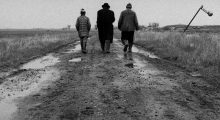
Interviewing Béla Tarr is pretty much like what you might expect from religiously reading every interview he does, and the below conversation is no exception to the rule: he speaks calmly, coming off as heated when you’re reading the interview, but the copious profanity is punctuation rather than ire. 25 years out from Sátántangó, Tarr has made himself available for press in light of its 4K restoration from Arbelos Films (the reissue enters limited release at Lincoln Center on October 18). I really couldn’t pass up a chance to talk to a legend—and that’s it! Filmmaker: I was reading some […]
by Vadim Rizov on Sep 26, 2019 -
TIFF 2018 Critic’s Notebook 8: In My Room, Wavelengths
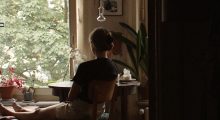
Here’s what I did not expect to see last Monday: Béla Tarr, hunched by a door before the fourth and final screening of the experimental Wavelengths shorts programs so crucial to my annual TIFF experience. I’d missed a trick–news that he’d be with us had been tweeted out that morning, but I’m glad I didn’t know. Dropping in one of the crucial film figures of the last 30 years was a shock to the system; the red-carpet clutter unavoidably inseparable from nearly any festival faded away, and for a few minutes there was just Tarr, as stringent as expected, talking about the young […]
by Vadim Rizov on Sep 19, 2018 -
“Agitating the Information”: Director Gus Van Sant on his Long-Take Columbine Drama, Elephant

The following interview was originally published in our Fall, 2003 print edition. When I first interviewed Gus Van Sant, he had just finished editing his feature Gerry and was preparing to launch it at the Sundance Film Festival. A radical left turn from the two studio films, Good Will Hunting and Finding Forrester, that preceded it, Gerry mixed together movie stars (Matt Damon and Casey Affleck), the “long-take” style of such filmmakers as Béla Tarr and Chantal Akerman and a simple yet metaphorically rich scenario taken from the news headlines. Working without a formal script but with the remarkable director […]
by Scott Macaulay on Jul 5, 2018 -
“… the Way Someone Would Shoot a Film in an Architectural Magazine”: Gus Van Sant on Last Days

The below interview with Gus Van Sant originally appeared in our Summer, 2005 issue. The subject matter of Gus Van Sant’s new film, Last Days, appears on the surface to be the stuff of a sensationalistic movie of the week. A moody, confused, perhaps drug-adled rock star Blake (Michael Pitt) — who bears more than a coincidental resemblance to Kurt Cobain — wanders aimlessly through a dilapidated mansion just before his end comes. Van Sant’s two previous films, which form a loose trilogy with Last Days, were also torn from the headlines: Gerry was inspired by a newspaper article about […]
by Peter Bowen on Jul 5, 2018 -
Hell on Earth: László Nemes on Son of Saul

László Nemes’s debut feature Son of Saul was awarded the Grand Prix at Cannes this year. Taking place over a 36-hour-period at Auschwitz in 1944, the film tells the story of Saul, a member of the “Sonderkommandos,” the Jews forced to handle the dead bodies in the crematorium. When Saul sees the body of a boy he believes to be his son, he goes on an impossible mission to try to save the body from the flames and find a rabbi who can recite the Kaddish to give the boy a proper burial. Saul risks everything and stops at nothing, […]
by Shevaun Mizrahi on Oct 28, 2015 -
Watch: What if Béla Tarr Made Polanski’s Repulsion?
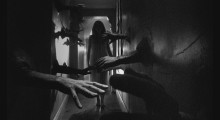
“Inside every narrative film is a non-narrative film struggling to get out.” Here is a wonderfully distinctive video essay from critics Adrian Martin and Christina Álvarez López that reimagines Roman Polanski’s Repulsion as the work of Béla Tarr. Zeroing in on “the dank spaces and the dead moments, the images of food-as-object, the cycle of everyday activities, the endless, implacable passages of walking,” and other Tarr associated imagery, Martin and López explore filmmaking as elementary particles, tonally rearrangeable in line with a director’s vision and story. In a supplementary write-up at MUBI, the two cite Jonathan Rosenbaum’s review of The Tenant, wherein […]
by Sarah Salovaara on Jan 12, 2015 -
Take Shelter — A Hammer to Nail Review
(Before world-premiering in the dramatic competition at the 2011 Sundance Film Festival, Take Shelter was picked up by Sony Classics. It went on to win the Grand Prize at Critics Week, as well as the FIPRESCI Prize, in Cannes. It opens theatrically in New York City and Los Angeles on Friday, September 30, 2011. Visit the official website to learn more.) [DISCLAIMER: I am very good friends with several of the key collaborators involved with the Take Shelter production. Ordinarily, I would absolve myself from writing a review based on far more tenuous connections, but in this particular case, I […]
by Michael Tully on Sep 29, 2011 -
THE 2011 EDINBURGH FILM FESTIVAL
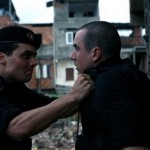
Spend even the shortest amount of time in the delightful and disturbing Scottish capital and you begin to read native Robert Louis Stevenson’s Strange Case of Dr. Jekyll and Mr. Hyde as a metaphor for the city itself. Edinburgh boasts a warm and welcoming population residing in an atmosphere where an ever-present hint of menace hangs palpably in the air like its famous rainy mist. (This openness is evidenced by the fact that one early afternoon my sister and I were able to pretty much wander in to a Justice Committee hearing of Parliament debating that day’s front page news […]
by Lauren Wissot on Jun 28, 2011 -
SOUND AND FURY: BELA TARR’S “THE TURIN HORSE” PLUS MORE AT THE CANNES FILM FESTIVAL
Sound design can be a filmmaker’s secret weapon. Psycho (1960) and Dirty Dancing (1987) aside, moviegoers are often hard pressed to remember the popular songs played in a film, let alone what a film itself sounded like. Yet in these layered, dense aural textures, every footstep and cigarette burn is meticulously tuned. Though it may never climb to the level of conscious analysis, this can have a deep psychological and emotional effect–particularly if the audience is treated to the top tier acoustics and audio systems of the theaters at the Cannes Film Festival. The sound work and soundtrack in director Lynne Ramsay‘s Morvern […]
by Livia Bloom Ingram on May 16, 2011
